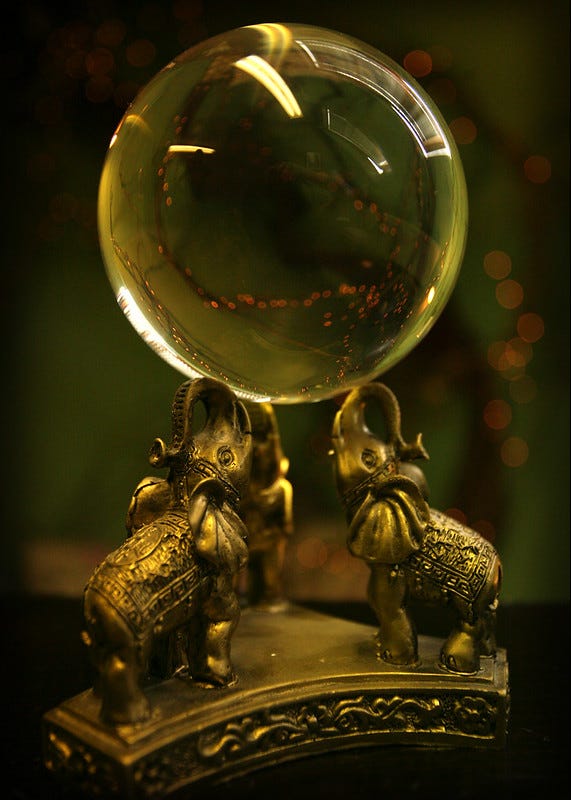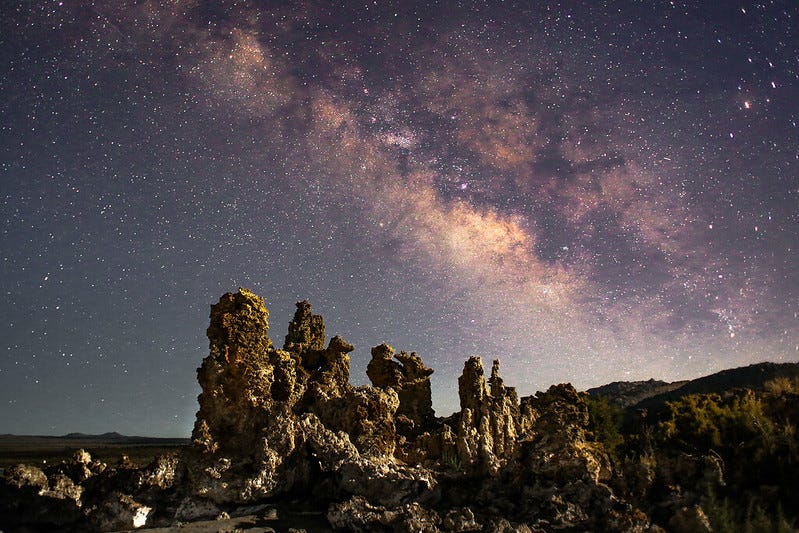Note to our readers: this essay on divination is the second in our ongoing symposium on vice. The first was on usury. Look out for further essays by us this Fall on curiosity and speculation — as well as our first guest essay.
When I was a teenager I used to try to read the future. I tried various methods, mostly discovered in the Wicca section of the now-defunct AOL Teen Message Board. There was Tarot – a particular favorite. There was astrology, of course, and also bibliomancy: looking for messages about my future in a line chosen at random from The Aeneid or a work of Baudelaire. I lit candles. I looked for my future husband in grounds of Turkish coffee. In sum, I believed, fervently, in an enchanted world.
I’d grown up on fairy-stories, which I read alongside the lives of saints. What I loved about Tarot, about the lighting of incense and candles, about the various spells I’d found on mid-aughts websites, was not solely the sense that my life could be predicted, but the wider, and more dizzying sense, that I could make connections between my own life and the world at large. What captivated me was the idea that some things (white candles, basil, the Queen of Swords) inherently meant other things (purity, love, a mysterious older woman with an intellectual bent), and that if I paid enough attention, I could understand what these things meant: the lattice of correspondence between my life and some grander story being played out in the heavens. If I paid enough attention, it seemed, I could work out the whole world.
I gave it up in adulthood, apart from the odd Tarot reading; I gave it up completely after converting to Christianity. I was not fully sure why. Part of it was a convert’s scrupulosity, a desire to be safe rather than sorry, as far as such things were concerned.
I was aware of the Biblical prohibition on divination, but I did not understand it. I supposed it had something to do with harnessing powers an ordinary person was not supposed to have, but that explanation always seemed to me incomplete. If it were possible to be “an observer of the times,” in the manner that Deuteronomy suggests, then that meant that, whether it was licit or not, from a Christian perspective, there existed a whole other world of creatures and spirits and meanings: a fairy-thick, enchanted world, where the iteration of the stars could tell you something real about what would happen to you tomorrow.

The idea that such a world might exist, and also be barred to Christians, likewise unsettled me. After all, it was precisely my love of, and wonder at, the possibility that a hidden enchantment might lurk behind and beneath the visible world that had brought me to faith in the first place. Could that magic — I worried, at my most scrupulous — in fact be inimical to the faith to which it had led?
I was aware of the Biblical prohibition on divination, but I did not understand it.
It is a worry that I even now retain, as I wrestle to separate what I loved, about that time in my life, from what I can or should no longer believe. For a long time, it was a question I had not resolved: what, exactly, is the problem with divination (from the Christian perspective, at least)? And, equally importantly, does divination work? Is there some invisible, fantastical world, parallel to the ordinary one, that we ought to avoid and fear — magic we as human beings ought not to have possession of, because it is the province of God alone? If so, furthermore, how do we know the difference between “divination” as something wicked and the kind of justifiable predictions that we associate with scientific inquiry? Few Christians would say that, for example, we ought not to predict tomorrow’s weather based on things observed. And, if the problem with divination were only that we are wrongly “playing God,” then surely divination is not different in kind from a host of other behaviors we critique: one can criticize divination on the same grounds as one criticizes cloning or capital punishment, as an improper arrogation of an authority that is not ours to have.
But I do not think that the prohibition on divination can simply be reduced to the idea that there are some things ordinary humans should not do. Rather, I have come to see the prohibition on divination as rooted in something specific to divination itself: the idea that the natural world holds within it the key to our personal futures, which we can discern through careful study or appropriate wielding of an obscure magic.
From this perspective, the problem with divination is not that it is too “magical,” but rather that it fails to grasp rightly the kind of magic that already exists in the world. Its practitioners are correct in supposing that the position of a star, of a tree, of the entrails of a certain bird, have something significant to say about the nature of reality that exceeds the way that we can describe it through science alone. But what they get wrong, I think, is reducing that reality to a mere set of propositions about our own personal lives, limiting the significance of these works of nature to the sphere of human purposes.

The magic behind the tree, the stars, the bird, is the magic of being itself, being that in turn points to the wondrousness of creation itself. We simultaneously are called to love trees (and stars and birds) as themselves, and as evidence of the glory and love of God who made them. Their precise haecceity, the way that they are themselves, in themselves, is also what makes them signs of a God by and for whom all creation is fearfully and wonderfully formed. To reduce the visible or invisible world to an instrument for discovering what we should do, to reduce the enchantment of creation to the question of whether some guy we met online will call us back or whether we will get a promotion in the next year, is an act not of wonder but of profound selfishness. It is an act of elevating our own earthly and individual destiny, at the expense of our shared participation in a creation in which the proclamation of the glory of God is a goal we share with all living things.
There is an enchantment in the stars, I believe, but that enchantment only spells our destiny insofar as we too hope that, in the end, we too can participate in such acts of love. Divination does not work, not because the stars have nothing to tell us, but because what they are busy telling us already is something far more important than the kind of questions we too often ask, and which matter far less.
I am less certain than I was what that spells for other, non-nature-based kinds of divination, or quasi-divination: the practice, say, of Tarot or bibliomancy when (as many of their contemporary practitioners argue) their purpose is not to predict the future but rather to help us make sense of ourselves, to use images or words in the service of helping us see ourselves with a necessary strangeness and distance.
My cautious inclination is that such practices are dangerous only to the extent that they encourage us to self-narrativize: to take images and words, legacies of others’ complexity, and reduce them to what they say about some particular problem we have right now. But I think that any theological account of why (and if) divination should be avoided must be rooted not in a fear of the possibilities of an enchanted world, but in a love of right enchantment: in a hope that, in seeing things properly, beauty and goodness converge.
There is, by contrast to my own, a purely defensive perspective when it comes to the magic of the world – identifying things that evoke awe, wonder, and a sense of numinous mystery (like, say, reading fantasy novels or playing Dungeons & Dragons) as dangerous in of themselves, and identifying, in turn, our reactions to this mystery merely as evidence of our misshapen souls. It is a perspective that is understandable, rooted in the (correct) notion that some of the things in this world that attract our attention are, in fact, wicked and destructive. But to think that anything that is not explicitly Christian, but evokes our sense of the magical, must necessarily be evil, I think, values too little our innate capacity for wonder, values too little the fact that we as human beings are drawn to the promise that our world contains a kind of unity of meaning that transcends individual apprehensions. It is one thing to say that we cannot trust a cognition warped by sin; it is another thing entirely to say that sin has broken us so irredeemably that our instinctive loves can tell us nothing whatsoever about the good.
There must, I think, be something in what draws us to the numinous, our sense of enchantment, of the world as a magical place: something that is imperfect and incomplete rather than dangerous or demonic. Divination is not the wrongful ascription of magic and meaning to the world, but rather a profound misreading of what, exactly, the world means.




I’ve had similar experiences with divination, especially with Tarot. I decided to forgo it because as someone with OCD, it was getting in the way of my ongoing treatment. Seeking “certainties” was satisfying in the moment, but damaging in the long-run.
An excellently argued piece once again!
I was raised in and practice a non-Christian religion, so my beliefs on this topic may be fundamentally different from yours. But what a prohibition on divination would mean for me is not to take metaphors too far - tarot is metaphorically true because it presents one with certain generalizable human archetypes and images, which can prompt reflection or a new perspective on life. But it is not literally true in the sense that what tarot cards you pick actually predict specific events in your life or compel you to act in a certain way. In other words, it does not work unless you believe in it, and you are under no obligation to believe in it.
But your perspective on divination was so thoughtfully put it made me reconsider my secular-liberal-literary outlook on life!